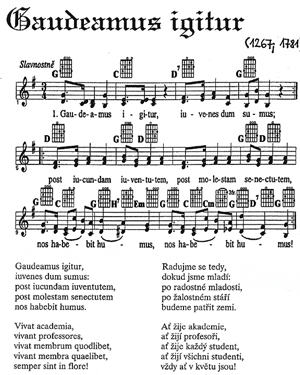 Martin sent me an email where he discusses "O Sacrum Convivium" by Miskinis. I think he has remarkable insight on the work:
Martin sent me an email where he discusses "O Sacrum Convivium" by Miskinis. I think he has remarkable insight on the work:I have been thinking about "O Sacrum Convivium" a lot. You have hinted at it in class, and you know, of course, that the song -both the lyrics and the musical techniques/features- are totally about the sacrament and the mystery of the eucharist. Rarely have I heard or sung a piece of music that so beautifully draws an accurate musical picture of the most holy sacrament and the concept of transubstantiation.
There is so much more beyond what we see on the surface. I mean, musically. The composer, whom I have come to respect a lot through previous pieces we have sung in choir, must be a man of deep faith as well as incredible intellectual understanding of the sacraments. The text stems, like many (most) other medieval Latin chants honoring the Holy Eucharist, from the feather of St. Thomas Aquinas, one of the great doctors and mystics of the church. The most famous of his songs of veneration of the most holy sacrament is the "Pange Lingua", which you are wel l familiar with, I am sure. The last two verses "Tantum ergo sacramentum" and "Genitori genitoque" of it are still sung today at Vespers in the Catholic Churches worldwide. The others you will only hear on Holy Thursday at the end of the Liturgy as the holy eucharist is taken out of the church (stripping of the altar). Another famous one of St. Thomas Aquinas is the "Adoro te devote" which we sang during communion at Patrick's and Holly's wedding, remember? Great author, and brilliant mind that Thomas!
The same is true for the composer. He, too, must have been well familiar with the writings of St. Thomas Aquinas. Thomas Aquinas draws heavily from the book of Revelations, of course. And if you have a moment, I would like to offer a very short selection from Revelations that I envision to be the source or image that I find reflected in the music (form, dynamics, contrasting middle section, meter change, continuum, even that very last note in the soprano, etc.). Have you noticed, for example, which word in the entire sung text "sticks out" the most? I would contend it is the latin word for mind: "mens". Ironically, "mens" is both complementary and opposite to "anima" (soul). The whole nature of the composition changes from that "anima-style" pulsating, etarnal, infinite adoration of the heavenly hosts, the elders, the angels and archangels as described in Rev. Chapter 4 and 5 to a more decisive, human-mind-driven, resolute tone.

The beginning of the piece is so soft and subtle that one can't really tell when it starts. All of a sudden one notices: it's there, the music has started. I believe that the intention may have been to suggest that the veneration has been forever ongoing, we are just now tuning in and getting a taste of it. It is eternal, not temporal. And it knows no rush, does it? I mean how much more floating and timeless can music be? There is no concept of time in eternity. Then comes the sudden break of that continuum, and the contrasting middle section takes off. And what about those meter changes in the contrasting middle section? Coincidence? Hardly! To me, it is intentional irregularity. As we celebrate the Eucharist, the commemoration of Christ's passion (Rev: the lamb that appears to be slain...), the full communion of God and man, where the earth reaches up to heaven, and the heaven opens up to the earth, our mind and reason struggles to comprehend the mystery of the sacrament. Our human struggle to understand what is beyond the capacity of the human mind is contrasted against the peaceful and never-ending adoration in the heavenly kingdom.
You used the image of "...the priest who keeps breaking the bread" in rehearsal one day. That is the part of today's sacred liturgy that commemorates the Lord's Supper, to which the church sings (or prays) the "Agnus Dei". What might be a more fitting image (in my own humble opinion) is the act of transubstantiation, the most holy moment of the mass, during which the priest holds the bread upward (usually as high as he can) as an offering to God.
The fact that this is the most sacred moment in the liturgy is underlined by several gestures that non-Catholics will easily notice: the kneeling, the sounding of bells and the use of incense (3 x 3 swings). That is what Catholics believe to be the moment of transubstantiation: we offer bread to God, and receive Christ in his true essence, who is consumed in the act of holy communion. In that sense, a translation of "sumitur" as "received" is one that takes a little bit of liberty. "Sumitur" might more fittingly be translated as "consumed": Christ is consumed, not just received.
Be that as it may, I feel that I might be boring you. Here I wanted to send you the links to Brahms and Gaudeamus Igitur, and now what ??-- Well, I guess I got carried away... Anyways, that "O Sacrum convivium" and the Stanford piece (GREAT English Cathedral music!!! So much like Hubert Parry's hymns and choral settings!) might well be my two favorites this semester. Two great selections - as are all others.






